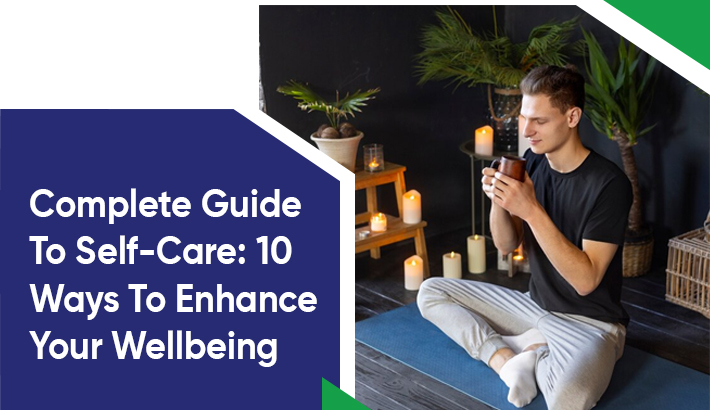Self-care isn't just a trendy buzzword; it's a fundamental practice that plays a pivotal role in maintaining overall wellbeing. In our fast-paced lives, dedicating time to self-care is often neglected, leading to stress, burnout, and a decline in mental and physical health.
Welcome to our comprehensive guide, where we aim to provide you with 10 ways to enhance your wellbeing through self-care practices. In the hustle and bustle of daily life, taking the time to prioritize yourself is not just a luxury but a necessity. Join us on this journey as we explore effective and practical self-care strategies that can make a significant difference in your life. Let's delve into the world of self-care and discover how simple yet impactful practices can contribute to a healthier, happier you.
I. Introduction
Self-care is a fundamental practice centered around deliberate actions aimed at enhancing and sustaining overall health, encompassing both physical and mental well-being. It transcends the sporadic indulgence of a spa day, reaching into the realm of daily habits and lifestyle choices. In essence, it's a commitment to oneself, acknowledging the importance of nurturing one's health on a continuous basis.
In the face of the relentless demands of contemporary living, self-care emerges as an indispensable tool for navigating the challenges of stress, warding off illnesses, and cultivating a positive mindset. It's not a luxury but rather a vital necessity for achieving a state of balance and fulfillment in life. Prioritizing self-care is an act of self-love and resilience, recognizing that by taking care of ourselves, we are better equipped to face the rigors of life with strength and vitality.
II. Physical Self-Care
Physical self-care encompasses a range of practices aimed at nurturing and maintaining your body's health and vitality. One crucial aspect is regular exercise, which can take various forms, from invigorating cardio workouts to calming yoga sessions. Engaging in physical activity not only boosts your mood by releasing endorphins but also contributes to better overall health, including cardiovascular fitness and muscular strength.
Additionally, balanced nutrition is a cornerstone of physical self-care. Providing your body with a well-rounded diet rich in essential nutrients not only supports energy levels but also plays a fundamental role in immune function, ensuring your body is equipped to handle daily challenges. Quality sleep is another vital component, as it allows your body to rest, recover, and rejuvenate, promoting both physical and mental wellbeing.
In the realm of physical self-care, prioritizing these elements creates a holistic approach to maintaining a healthy lifestyle. It's not just about the occasional jog or salad but cultivating habits that sustain your body's resilience and enhance your overall quality of life. From the rhythmic beat of your heart during exercise to the rejuvenating power of a good night's sleep, physical self-care is a journey of intentional actions that contribute to your body's longevity and vitality.
III. Emotional Self-Care
Emotional self-care is a vital aspect of overall wellbeing, encompassing practices that nurture and support our emotional health. It involves the intentional effort to understand, acknowledge, and address our emotions in a constructive manner. One key element of emotional self-care is stress management, where individuals engage in activities like deep breathing exercises, meditation, or journaling to alleviate stress and promote emotional resilience. This helps in developing a heightened sense of self-awareness, enabling individuals to navigate life's challenges with a more composed and balanced mindset.
Another crucial dimension of emotional self-care involves fostering healthy emotional expression. This includes embracing and communicating our feelings in a safe and supportive environment. Whether through open conversations with trusted friends, engaging in artistic expressions, or simply allowing ourselves to feel and process emotions without judgment, this practice promotes emotional authenticity and contributes to a more profound understanding of ourselves. By incorporating these types of emotional self-care into our daily lives, we cultivate emotional intelligence, build resilience, and create a foundation for sustained emotional wellbeing.
IV. Mental Self-Care
Mental self-care is a crucial aspect of overall wellbeing, focusing on nurturing and preserving the health of our minds. It encompasses various practices and activities that contribute to mental clarity, emotional stability, and cognitive resilience. One fundamental type of mental self-care involves intellectual stimulation. Engaging in activities that challenge the mind, such as reading, solving puzzles, or learning a new skill, not only provides a mental workout but also promotes cognitive health. This type of self-care encourages continuous learning and contributes to a sense of accomplishment, keeping the mind agile and sharp.
Another significant dimension of mental self-care is learning and growth. This goes beyond formal education and embraces the idea that personal development is a lifelong journey. Whether it's pursuing a new hobby, attending workshops, or acquiring new knowledge, the process of learning and growth enriches our lives and contributes to a more fulfilling mental state. It's about fostering curiosity, staying open-minded, and embracing opportunities for self-improvement, ultimately enhancing our mental resilience and adaptability in the face of life's challenges.
Setting boundaries is a critical form of mental self-care that often gets overlooked. Learning to say 'no' when necessary and establishing limits on what we can handle prevents mental exhaustion and burnout. By respecting our own boundaries, we create a healthier mental space, allowing us to focus on priorities and maintain a sense of control over our lives. This type of mental self-care empowers individuals to protect their mental energy and emotional wellbeing, fostering a more sustainable and balanced approach to life's demands.
V. Social Self-Care
Social self-care is an important part of overall wellbeing, encompassing various activities and practices that foster healthy connections and relationships. One significant type of social self-care involves building and nurturing relationships. This includes spending quality time with friends, family, and loved ones, actively engaging in conversations, and creating meaningful connections. Establishing a support system is equally vital, as it provides a network of individuals who offer understanding, empathy, and encouragement during both joyous and challenging times. Cultivating strong, positive relationships contributes immensely to emotional and mental resilience.
Another facet of social self-care revolves around participating in socializing activities. Whether it's joining clubs, attending social events, or participating in community gatherings, these activities play a key role in promoting a sense of belonging and connection. Socializing provides an opportunity to share experiences, ideas, and laughter, fostering a supportive community that enhances overall wellbeing. In today's digital age, virtual interactions also play a significant role in social self-care, allowing individuals to connect with like-minded people globally and broaden their social circles.
Lastly, social self-care emphasizes the importance of self-awareness and understanding one's social needs. This involves recognizing the balance between alone time and socializing, understanding personal boundaries, and being mindful of the impact of social interactions on one's emotional state. Taking the time to engage in activities that align with personal preferences and values ensures that social self-care is authentic and fulfilling. By incorporating these practices into daily life, individuals can enhance their social wellbeing and contribute to a more balanced and satisfying lifestyle.
VI. Environmental Self-Care
Environmental self-care encompasses various practices aimed at nurturing your surroundings to promote overall wellbeing. One crucial aspect of this self-care type involves creating a comfortable and harmonious living or working space. This includes arranging your surroundings in a way that promotes relaxation, reduces stress, and enhances your overall mood. Whether it's adding personal touches to your home, incorporating soothing colors, or organizing your workspace efficiently, the goal is to establish an environment that positively influences your mental and emotional state.
Another facet of environmental self-care involves the principles of decluttering and organizing. A clutter-free space not only contributes to a more aesthetically pleasing environment but also plays a significant role in mental clarity and focus. Taking the time to declutter both your physical and digital spaces can lead to a sense of accomplishment and order, creating a conducive atmosphere for productivity and a peaceful state of mind. This practice is not just about the physical act of tidying up; it's a holistic approach to creating an environment that supports your mental and emotional needs.
Connecting with nature is a powerful component of environmental self-care. Spending time outdoors, whether it's a leisurely walk in a nearby park, hiking in nature reserves, or simply sitting in your garden, has proven benefits for mental health. Nature has a calming effect and can act as a natural stress reliever. By immersing yourself in the beauty of the outdoors, you can rejuvenate your mind, gain perspective, and foster a deeper connection with the natural world, contributing to your overall sense of wellbeing. Environmental self-care, therefore, is a holistic practice that recognizes the profound impact our surroundings have on our mental and emotional health, encouraging intentional actions to create a nurturing environment.
VII. Financial Self-Care
Financial self-care is a valuable aspect of overall wellbeing, encompassing various practices that empower individuals to take control of their financial health. One fundamental type of financial self-care is budgeting and financial planning. This involves creating a realistic budget that outlines income, expenses, and savings goals. By tracking and managing finances effectively, individuals can alleviate stress and make informed decisions about their money, fostering a sense of financial security.
Another key element of financial self-care is investing in personal development. This goes beyond traditional financial investments and includes allocating resources to activities and experiences that contribute to one's personal and professional growth. Whether it's attending workshops, furthering education, or acquiring new skills, investing in oneself can lead to increased earning potential and improved overall financial wellbeing.
Avoiding financial stress is also a significant form of financial self-care. Making informed decisions, avoiding unnecessary debt, and having an emergency fund are crucial steps in mitigating financial stressors. By maintaining a healthy financial mindset and proactively managing money, individuals can create a foundation for long-term financial stability, reducing anxiety and promoting a positive relationship with their finances. Financial self-care, therefore, is not just about managing money; it's about cultivating a mindset and practices that contribute to a secure and fulfilling financial future.
VIII. Time Management for Self-Care
In the realm of self-care, effective time management is a game-changer, allowing individuals to carve out moments of rejuvenation amid the chaos of daily life. One approach to time management for self-care involves prioritizing tasks based on urgency and importance. By categorizing activities into quadrants, such as the Eisenhower Matrix, individuals can focus on what truly matters, ensuring that crucial self-care practices don't get lost in the shuffle. This method empowers individuals to allocate time efficiently, striking between work-life balance, personal life, and moments dedicated to their own wellbeing.
Another effective strategy is the Pomodoro Technique, a time management method that breaks the day into intervals, typically 25 minutes in length, separated by short breaks. This technique not only enhances productivity but also prevents burnout by incorporating regular breaks for self-care. It encourages individuals to immerse themselves fully in a task for a set period, followed by a brief pause to stretch, relax, or engage in a quick self-care ritual. This structured yet flexible approach helps in maintaining focus while fostering a mindful awareness of one's own needs.
Lastly, holistic time management for self-care involves creating a personalized routine that integrates various aspects of wellbeing. This approach recognizes that self-care is multi-faceted, encompassing physical, emotional, and mental aspects. By scheduling specific times for exercise, relaxation, and activities that bring joy, individuals can ensure a comprehensive approach to self-care. This tailored routine not only optimizes time but also makes self-care a consistent and integral part of daily life, promoting a sustained sense of balance and overall wellbeing.
IX. Combining Self-Care Practices
Combining self-care practices is like creating a personalized symphony of well-being, where each note harmonizes with the others to create a beautiful melody of holistic health. One powerful way to intertwine different self-care practices is by establishing a daily routine that seamlessly incorporates physical, emotional, mental, and social well-being. For instance, starting the day with a brisk walk or a short workout not only enhances physical health but also kickstarts the morning with positive energy. Following it up with a few minutes of mindfulness or meditation contributes to emotional and mental well-being, setting a positive tone for the day. This combination allows individuals to address multiple aspects of their well-being in a time-efficient manner.
Moreover, the art of balancing different self-care practices is crucial for sustained well-being. It involves recognizing the ebb and flow of various aspects of life and adjusting self-care routines accordingly. For instance, during times of heightened stress, emphasizing emotional self-care through activities like journaling or engaging in a hobby can provide a much-needed outlet. Similarly, during periods of physical fatigue, placing a greater focus on rest and relaxation becomes paramount. This dynamic approach to self-care ensures that individuals can navigate the complexities of life with resilience, adapting their self-care practices to meet the specific needs of the moment.
Adapting to changing needs is the final nuance of combining self-care practices. Life is fluid, and so are our requirements for well-being. Being attuned to these changes and flexibly adjusting self-care routines is essential for long-term effectiveness. It might involve experimenting with new practices, modifying existing ones, or even seeking support from others. The key is to remain open to the evolving nature of our lives and to tailor self-care practices accordingly. In doing so, individuals can create a sustainable and evolving approach to well-being that grows with them through different seasons of life.
X. Conclusion
In conclusion, recognizing the pivotal role of self-care in our lives is not just a luxury; it's a fundamental necessity for a life filled with fulfillment and resilience. By placing emphasis on the various facets of our wellbeing—physical, emotional, mental, social, environmental, and financial—we pave the way for a more holistic and content existence. It's not merely about occasional indulgences; it's about weaving self-care into the fabric of our daily routines, acknowledging its profound impact on our overall happiness and ability to face life's challenges.
For those contemplating the initiation of a self-care journey, the encouragement is simple yet powerful. Taking that first step towards a healthier and happier life doesn't require grand gestures. Instead, it's about embracing small, consistent efforts that, over time, yield significant and lasting results. The invitation is extended to weave these self-care practices into your daily routine, acknowledging that self-care is not a one-size-fits-all concept. It's about discovering what resonates with you personally and making a commitment to prioritize your own wellbeing.
So, to all the readers contemplating this shift towards self-care, remember that you are deserving of the time and effort it takes to nurture yourself. In doing so, you not only enhance your own life but also empower yourself to navigate the complexities of the world with resilience and a renewed sense of vitality. Take that step, no matter how small, and watch as it transforms into a journey of self-discovery and lasting wellbeing.
FAQs
Q1. How can I find time for self-care in a busy schedule?
Finding time for self-care requires prioritization. Start by allocating small pockets of time for activities that bring you joy and relaxation.
Q2. Is self-care only about pampering oneself?
No, self-care goes beyond pampering. It includes actions that contribute to your physical, emotional, and mental wellbeing.
Q3. Can I practice self-care on a budget?
Absolutely! Many self-care practices, such as meditation, walking, and reading, require little to no cost.
Q4. How do I know which self-care practices are right for me?
Experiment with different practices and observe what brings you joy, relaxation, and a sense of fulfillment.
Q5. Is it selfish to prioritize self-care over other responsibilities?
No, prioritizing self-care is essential for your overall wellbeing. Taking care of yourself enables you to better fulfill your responsibilities.






Leave a reply